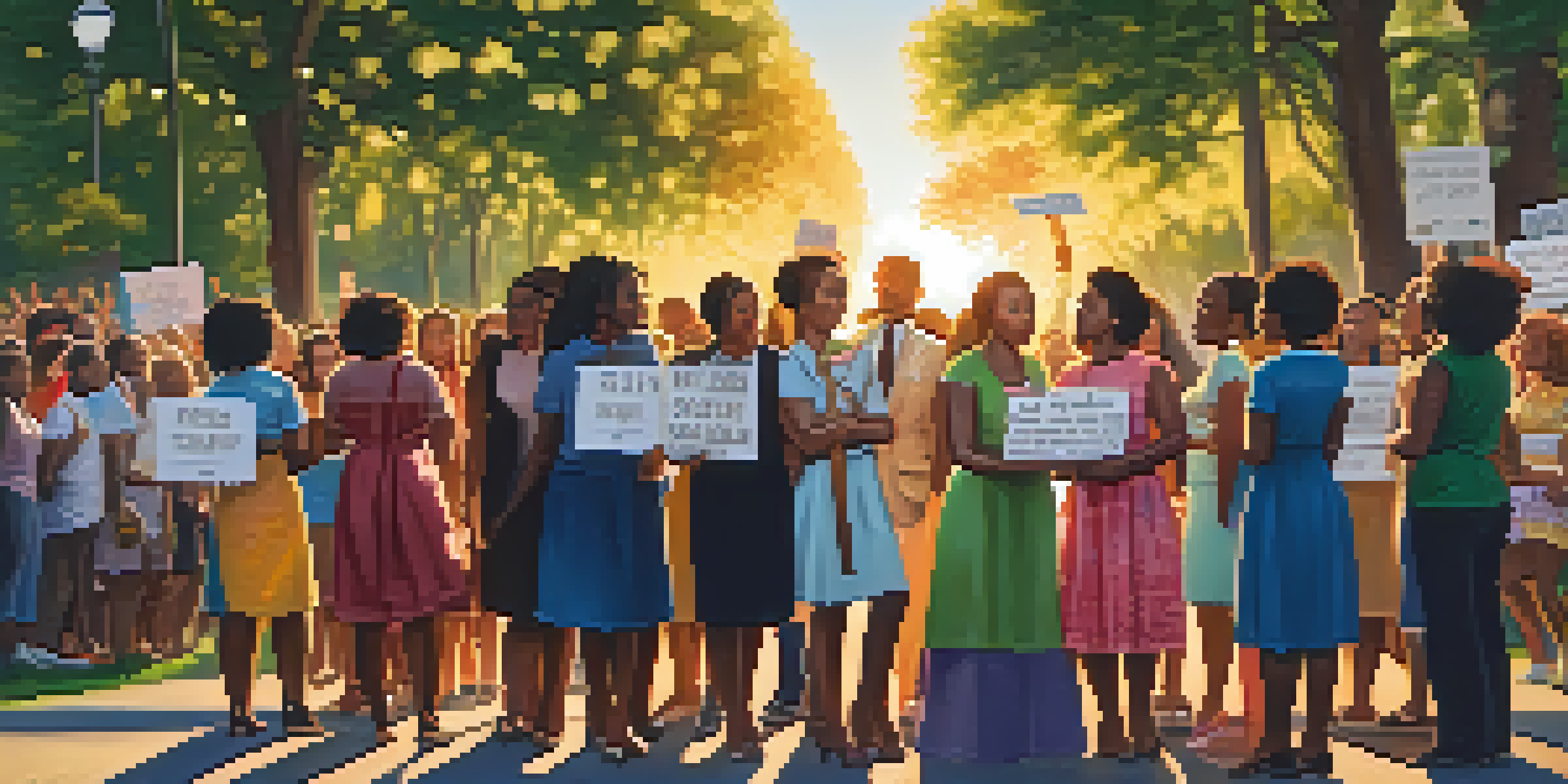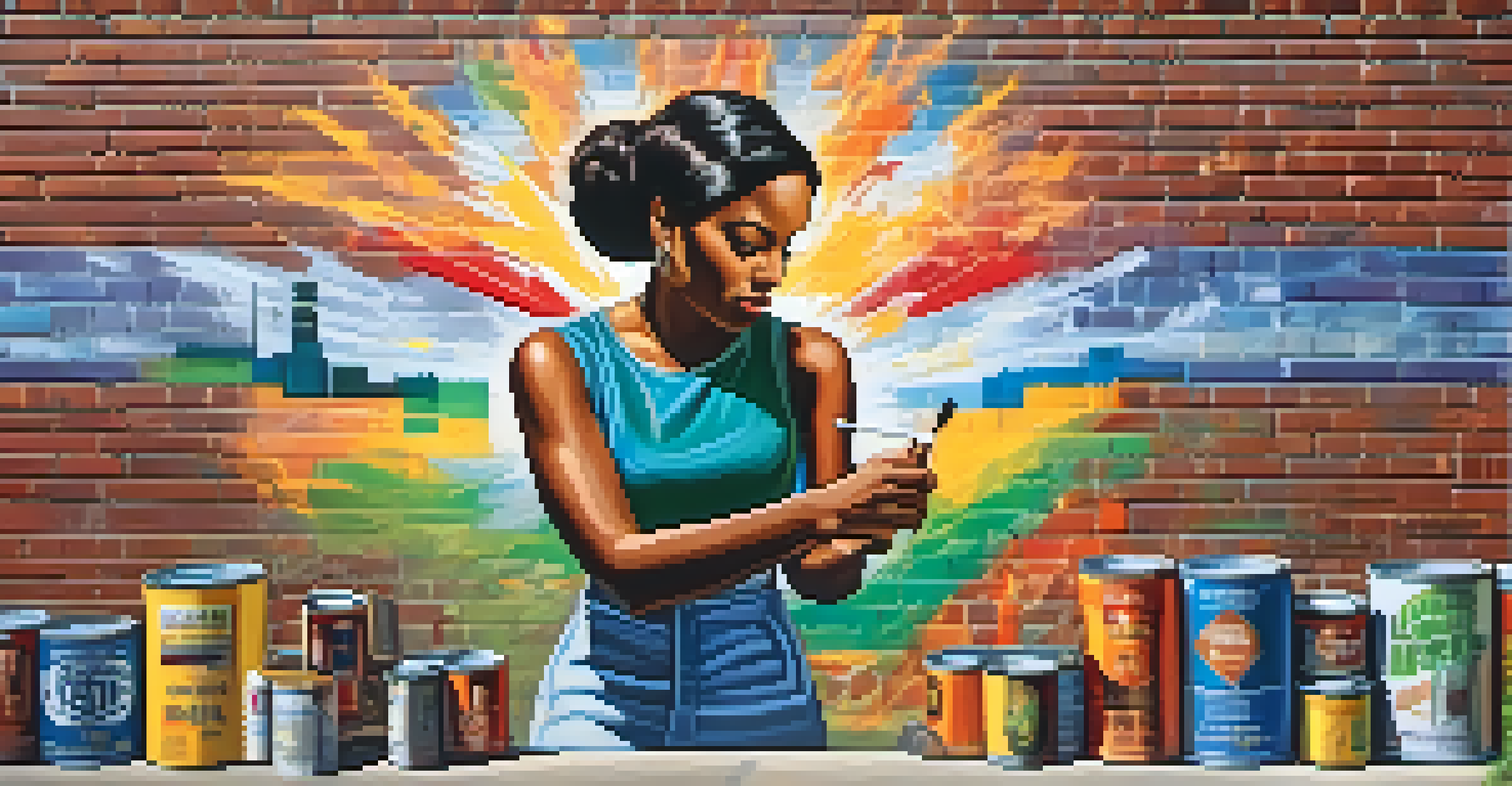Women in the Atlanta Civil Rights Movement: Unsung Heroes

The Backbone of the Movement: Women Leaders
While many recognize figures like Martin Luther King Jr., women were often the backbone of the Civil Rights Movement in Atlanta. Leaders like Coretta Scott King and Ella Baker played crucial roles in organizing protests, rallies, and community outreach. Their leadership styles brought a unique perspective that emphasized collaboration and grassroots involvement.
Women are the real architects of society.
These women not only influenced policy but also inspired countless individuals to join the struggle for equality. They served as the glue that held the movement together, ensuring that the voices of the marginalized were heard loud and clear. Without their contributions, the civil rights efforts would have lacked the depth and resilience they displayed.
Their commitment to justice extended beyond the public sphere; many women balanced personal sacrifices at home while fighting for civil rights. This dual burden showcased their unwavering dedication to the cause, making them unsung heroes whose stories deserve recognition.
Grassroots Organizing: Women at the Forefront
Women played a pivotal role in grassroots organizing during the Atlanta Civil Rights Movement. They were often the ones who mobilized community members, organized meetings, and created strategies for effective protest. Their ability to connect with individuals on a personal level helped build a united front against racial injustice.

For instance, groups like the Atlanta Student Movement were heavily influenced by the determination and vision of female leaders. These women harnessed their networks to spread the message of equality and justice, inspiring students and families alike to take a stand. Their work laid the foundation for major demonstrations that would challenge systemic racism.
Women as Key Civil Rights Leaders
Women like Coretta Scott King and Ella Baker were instrumental in organizing and leading the Civil Rights Movement, emphasizing collaboration and grassroots involvement.
These grassroots efforts were often overlooked in historical accounts, but they were essential in creating the momentum needed for larger actions. Women’s roles in these initiatives highlight how crucial community engagement is in social movements, reminding us that change often starts at the local level.
Education and Advocacy: Women as Teachers
Education emerged as a vital tool for empowerment during the Civil Rights Movement, and women were at the forefront of this effort. They organized literacy programs and community workshops to educate others about their rights and the importance of civic engagement. This focus on education helped to inform and empower individuals to participate in the struggle for equality.
The most common way people give up their power is by thinking they don't have any.
Women like Dr. Benjamin Mays’ wife, who was instrumental in setting up educational initiatives, understood that knowledge was power. They fought not only for access to quality education but also for curriculum changes that accurately reflected the contributions of Black individuals to American history. Through these efforts, they cultivated a generation that was informed and ready to challenge injustice.
Their advocacy extended beyond the classroom, as they often participated in protests and marches to demand educational reforms. This dual role as educators and activists made them key figures in the movement, showcasing how intertwined education and social justice can be.
Women in the Media: Shaping Public Perception
Women also played an essential role in shaping the narrative of the Civil Rights Movement through the media. Journalists, photographers, and writers used their platforms to highlight injustices and bring attention to the struggles faced by African Americans. Their work was crucial in rallying support and generating empathy from broader audiences.
Figures like Alice Walker, who later gained fame as a novelist, began her career as a journalist focused on civil rights issues. She documented the realities of the movement, ensuring that the voices of women were included in the larger narrative. This representation was vital in shifting public perception and gaining support for the cause.
Grassroots Organizing by Women
Through grassroots organizing, women mobilized communities and inspired collective action against racial injustice, proving essential for the movement's momentum.
Moreover, their contributions in media brought to light the often-overlooked stories of women activists. By shining a spotlight on these unsung heroes, they helped create a more comprehensive understanding of the movement, emphasizing that change is not only made by prominent leaders but also by everyday women.
Role of Faith: Women in Religious Communities
Faith played a central role in the Civil Rights Movement, and many women utilized their religious communities to foster change. Churches became safe havens for organizing, and women often took on leadership roles within these spaces. Their faith not only provided them with strength but also inspired others to join in the fight for justice.
Women like Rev. Dr. Josephine E. Smith were instrumental in bridging faith and activism. They organized prayer vigils and rallies, emphasizing the spiritual dimensions of the fight against oppression. This connection between faith and social justice attracted more individuals to the cause, uniting various community members under a shared vision.
These women knew the power of collective prayer and community action, showing that spiritual conviction could fuel a political movement. Their efforts remind us that social change can emerge from the intersection of faith and activism, creating a powerful force for justice.
Cultural Contributions: Women as Artists and Activists
Women in the Atlanta Civil Rights Movement also made significant cultural contributions through art and literature. They used their creative talents to express the struggles and aspirations of the African American community. This artistic expression became a powerful tool for activism, resonating with many and inspiring action.
Musicians, poets, and visual artists like Georgia Douglas Johnson used their platforms to challenge societal norms and highlight the fight for equality. Their art not only provided a voice for the movement but also served as a form of healing and empowerment for those involved. Through their creativity, they conveyed messages of resilience and hope.
Cultural Impact of Women Artists
Women used art and literature to express the struggles of the African American community, serving as powerful tools for activism and healing.
Moreover, these cultural contributions helped to shape the identity of the movement, allowing individuals to connect on a deeper emotional level. The blend of art and activism created a rich tapestry that illustrated the multifaceted nature of the struggle for civil rights, showcasing how creativity can drive social change.
Legacy of Women in the Civil Rights Movement
The legacy of women in the Atlanta Civil Rights Movement is profound and far-reaching. Their contributions laid the groundwork for future generations of activists. By championing equality and justice, they not only changed the landscape of their time but also inspired countless others to continue the fight.
Today, we see the impact of their work in ongoing civil rights struggles. The principles they fought for remain relevant, as issues of inequality and injustice persist. Their stories serve as reminders that the fight for civil rights is a continuous journey, one that requires dedication and courage from all of us.

Celebrating their legacy means honoring the unsung heroes who worked tirelessly behind the scenes. It encourages us to reflect on our roles in advocating for justice and reminds us that every action contributes to the larger movement, continuing the fight they so passionately led.
In Conclusion: Recognizing Women’s Contributions
As we reflect on the Atlanta Civil Rights Movement, it's essential to recognize the invaluable contributions of women. Their roles as leaders, organizers, educators, and artists shaped the movement in ways that are often overlooked. By celebrating their stories, we honor their sacrifices and commitment to justice.
Acknowledging these unsung heroes helps to create a more inclusive narrative of the Civil Rights Movement. It emphasizes that every voice matters in the fight for equality and that women were not just supporters but pivotal players in this historical struggle. Their legacy serves as a source of inspiration for current and future generations.
In recognizing women's contributions, we not only pay tribute to their efforts but also commit ourselves to continuing their work. The fight for civil rights and social justice is ongoing, and it is up to each of us to carry the torch and ensure that their stories are never forgotten.